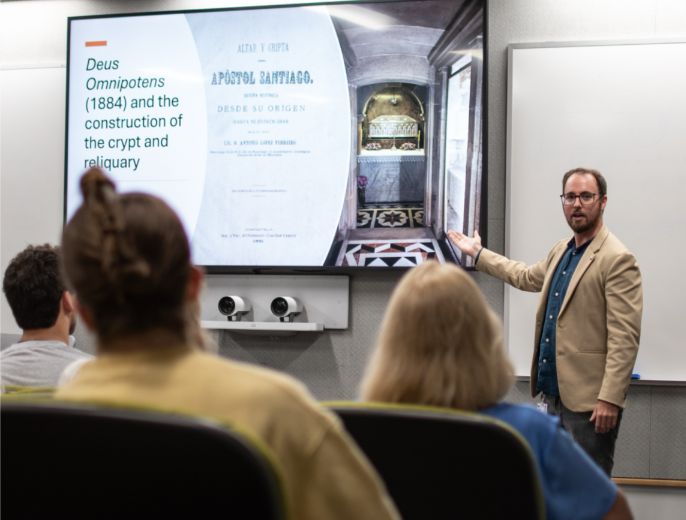
El Camino De Santiago Requires a New Perspective
Dr. Ryan Goodman traces the ongoing impact of the medieval pilgrimage on the modern day
On Sept. 19, I attended a talk presented by The Medieval and Early Studies Program in Greene Hall titled “Reinventing the Camino De Santiago — for Modern Problems, Medieval Solutions?” A visiting assistant professor in the Department of Spanish at Wake Forest, Dr. Ryan Goodman, delivered a thought-provoking presentation on the motivations of pilgrimage and how cultures shape the desire to seek out a specific place away from home.
His presentation distinctly differed from my expectations. Instead of offering a perspective isolated in the time of the Middle Ages, Goodman integrated the historical background of the pilgrimage of the Camino De Santiago into modern-day discourse.
At first, Goodman described his own story as a pilgrim on the Camino De Santiago.
On the way, he met people from every walk of life. For many, this pilgrimage holds a spiritual significance — such as Christians, who travel to view the shrine of the apostle James. However, as Goodman outlined, many do not complete the pilgrimage for religious motivations. He also encountered a Muslim woman on the way, in addition to other travelers who either wanted to escape the confines of reality or reconnect with nature.
On his pilgrimage, he noted a gap in historical knowledge about Galicia, Spain from the Medieval times to the modern day. For most of his talk, he outlined the culture of Spain throughout this time highlighting the Spanish Civil War in the 1930s.
Goodman drew attention to the impact tourism has had on the region, as almost all jobs relate to tourism in some way. The current system forces local people to depend on tourism. According to Goodman, the area surrounding the Camino De Santiago is desolate, occupied by only AirBnBs for people traveling to the area. The current economic situation in Galicia exploits the people working in order to preserve bustling tourism in the region.
Goodman refers back to the Medieval motivations for pilgrimage as a potential source of solutions to the economic situation in Galicia. As an English major taking a course in Geoffrey Chaucer, I’ve already learned so much about the Medieval pilgrimage from careful examination of The Canterbury Tales.
Pilgrims in Medieval times came from all walks of life. While some came for spiritual reasons, many desired the ability to learn through experience. Like a pilgrim in one of Chaucer’s stories, Goodman learned from his travels. He learned to appreciate a new part of the world and its culture. He also learned the importance of appreciation instead of exploitation. The tourist culture aims to exploit the area of Galicia, while pilgrims aim to appreciate the place they seek out.
Though people often assume that the Medieval period lacks cultural relevance, Goodman describes how Medieval motivations may even be the solution to modern-day problems.